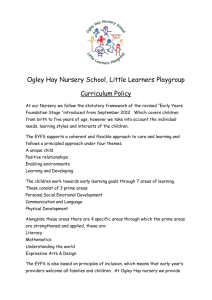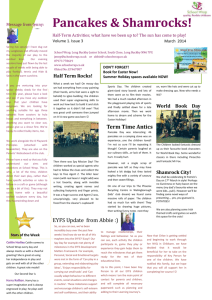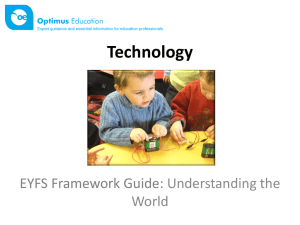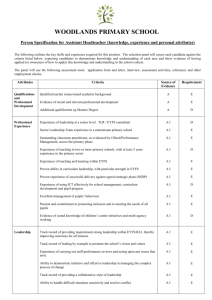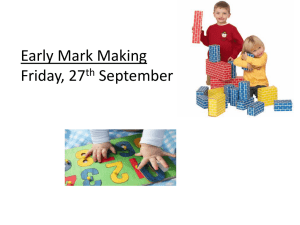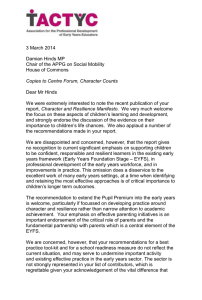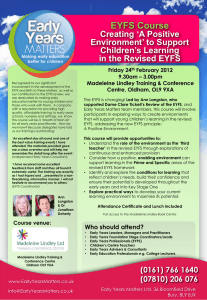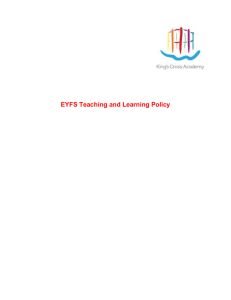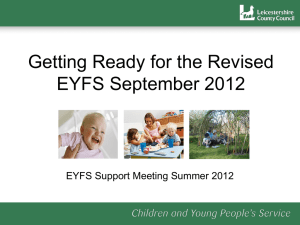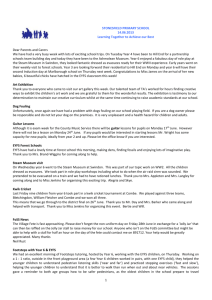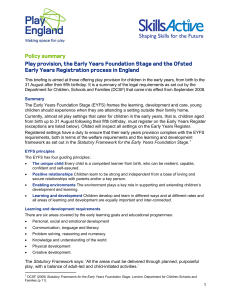Countdown to EYFS profile 2013 presentation
advertisement
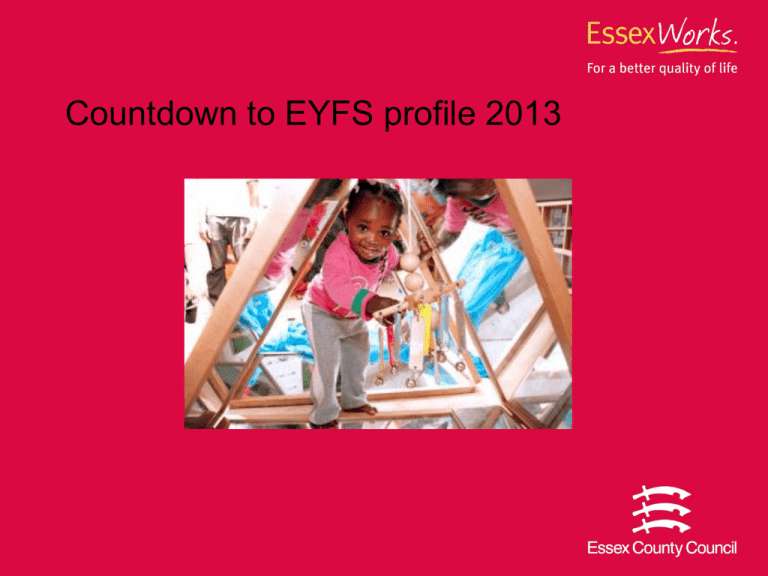
Countdown to EYFS profile 2013 The EYFS Profile How should we assess children in the meantime? • The EYFS Profile is the summative assessment which practitioners should complete during the summer term in which a child turns 5. It is not intended to be used for ongoing assessment, or, for example, for entry level assessment to early years setting or reception classes. The Government does not prescribe how ongoing assessment should be undertaken. An updated version of Development matters in the Early Years Foundation Stage was published alongside the EYFS in March 2012, which early years providers we hope will find useful in helping them to make judgements about ongoing monitoring and assessment of children, prior to undertaking the EYFS Profile • New FAQ’s www.foundationyears.org.uk 2 Objectives Practitioners will: • Understand the assessment requirements within the revised EYFS • Consider ways to record assessments • Share materials for tracking progress 3 Assessment requirements “Assessment plays an important part in helping parents, carers and practitioners to recognise children’s progress, understand their needs, and to plan activities and support. Ongoing assessment (also known as formative assessment) is an integral part of the learning and development process. It involves practitioners observing children to understand their level of achievement, interests and learning styles, and to then shape learning experiences for each child reflecting those observations. 4 In their interactions with children, practitioners should respond to their own day-to-day observations about children’s progress, and observations that parents and carers share.” Statutory framework p.10 para 2.1 5 Good assessment practice..... • Includes the child’s perspective and the views of those who know the child. • Is based on holistic observations of the child by adults who can tune into the variety of ways a child demonstrates knowledge skills and understanding. • Is accurate and reliable when based on child initiated/independent activity in a variety of contexts. 6 Good observational assessment will: • Make learning visible to enable effective interpretation of the child’s knowledge, skills and understanding and inform provision. • Enable tracking of children’s progress. • Support effective dialogue about learning with the child, parents, colleagues, senior managers. • Demonstrate how well the school is meeting needs and supporting attainment. 7 Characteristics of effective learning • What are they.... Playing and exploring (engagement) Active learning (motivation) Creating and thinking critically (thinking) • How will they influence provision.... Threaded through entire curriculum • Requirements.... – short commentary to accompany EYFSP passed on to Y1 teacher 8 Quote from letter to children at an outstanding school “You told us that you like school and we could see why, particularly when we saw the interesting lessons you have and the exciting activities you have outside. … Teaching is excellent and all the adults care about you a great deal and work hard on your behalf. We could see that your attainment is above average and you make outstanding progress because teachers and teaching assistants keep a close eye on how well you are getting on. Your head teacher and teachers provide excellent leadership and are always working hard to make your school such an exciting place to be.” 9 Data!!!! • Why collect data? • What do you want it to show? • Examples - ways of collecting including target tracker. 10 Tracking and demonstrating progress • Progress in EYFS will be judged as a cumulative result and impact of the following factors: • Outcomes at the end of EYFS in relation to the Early Learning Goals • End of EYFS profile data in relation to children’s starting points. This will be particularly important to determine accelerated progress of any individuals or groups of children including EAL, SEN, More Able, Boys etc • for those schools where children are aged three and four years old and move to primary school before any nationally comparable assessments are made, the judgement should be based on an evaluation of children’s learning and progress relative to their age and evidence of their starting points 11 Progress will also be based on… • • • • • • 12 Observations of lessons/sessions or other experiences and learning activities including that supported through the indoor and outdoor environments over time as a result of rich continuous provision and effective interaction and partnership from supportive adults. Any evidence – material or anecdotal ie. learning Journeys, photographs, dialogue, parental comments and information etc.. will demonstrate progress and the quality of teaching and learning. This is particularly important for the lowest attaining children Discussion with parents and other significant adults working with the children Discussion with the children – ‘Explore and Explain’ Mantra from Nursery Class September 2012. Children’s progress in EYFS in the last three years – noting trends in performance significantly above or below national, particularly for CLA, SEN, Boys etc.. the proportions meeting and exceeding expected progress from different starting points compared with national figures How schools are judged- achievement Achievement has an increased focus on… The proportions of children in comparison with national figures (yet to be released!) who, from each starting point, - Make expected progress - Make more than expected progress 13
